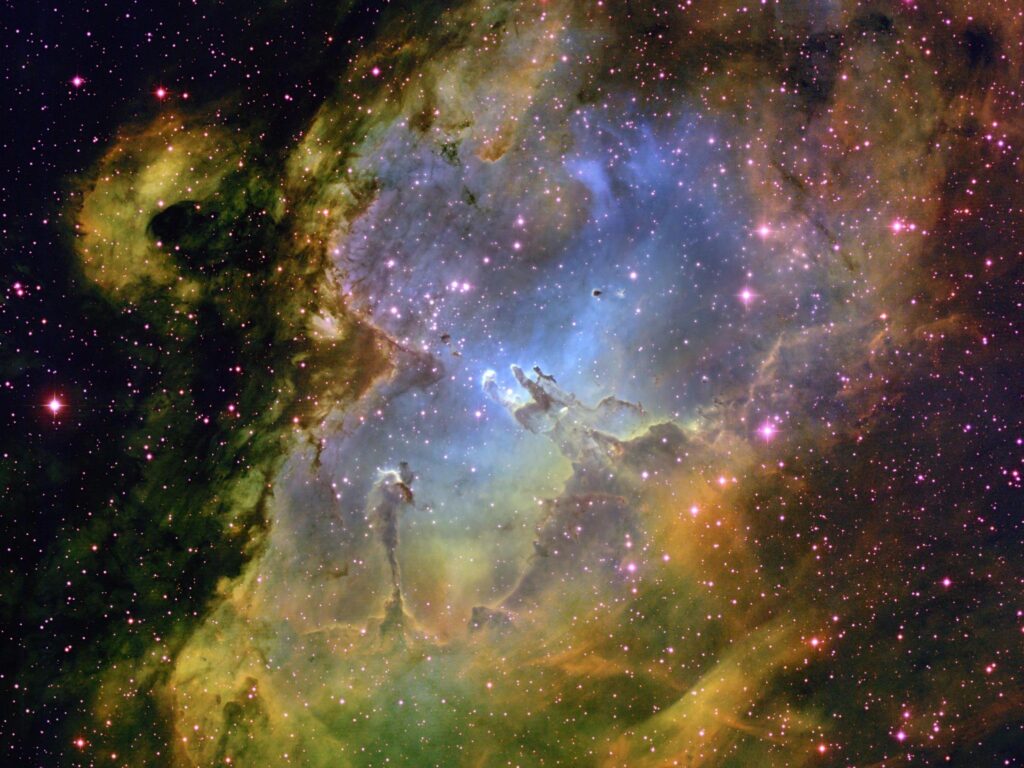The cosmos continues to captivate scientists and enthusiasts alike, especially as we uncover more about its early stages. Recent findings from NASA’s James Webb Space Telescope (Webb) have shed light on the formation of galaxies during the infancy of the universe, approximately 400 to 600 million years after the Big Bang. This groundbreaking discovery involves three galaxies that are actively forming, surrounded by dense clouds of gas—primarily hydrogen and helium, the primordial elements of the cosmos.
Galactic Formation Fueled by Cold Gas
Webb’s incredibly sensitive instruments have detected an unusually high concentration of cold gas enveloping these galaxies. This gas, primarily composed of hydrogen and helium, is expected to play a crucial role in the creation of new stars within these galaxies.

According to Kasper Heintz, an assistant professor of astrophysics at the Cosmic Dawn Center (DAWN) at the University of Copenhagen, “these galaxies resemble sparkling islands amid a vast, neutral ocean of opaque gas.” He emphasizes that without Webb’s cutting-edge technology, observing these early galaxies and understanding their formation would have been nearly impossible.
A New Perspective on Galactic Ecosystems
The concept of galaxies as isolated ecosystems is being challenged by these findings. Instead, galaxies in this early stage of the universe appear to be intimately connected to the intergalactic medium, which is a network of filaments and structures made of pristine gas.
Simone Nielsen, a Ph.D. student at DAWN and co-author of the study, highlights that these early galaxies are deeply intertwined with their surroundings, indicating a complex interdependence in the cosmic environment.
James Webb Space’s Unprecedented Capabilities
Webb is not only fulfilling its mission objectives but also surpassing expectations by providing unprecedented images and data of these distant galaxies. Gabriel Brammer, an associate professor at DAWN and co-author of the study, mentions that before Webb, obtaining such detailed information about these far-off galaxies was impossible. He adds that the research team had a good sense of what to expect from the data, making these findings both thrilling and anticipated.
Future Research and Unanswered Questions
Despite these exciting discoveries, many questions remain. Researchers are eager to explore the precise location of this gas within the galaxies. Is it concentrated near the centers, or is it more dispersed in the outskirts?
Furthermore, the composition of the gas—whether it remains pristine or has already begun incorporating heavier elements—is a topic of significant interest. Kasper Heintz notes that the next phase of research will involve building large statistical samples of galaxies to quantify and understand these features in greater detail.
A Milestone in Cosmic Exploration
These findings were made possible through Webb’s Cosmic Evolution Early Release Science (CEERS) Survey, which includes spectra of distant galaxies obtained by the telescope’s Near-Infrared Spectrograph (NIRSpec). This data was released as part of Webb’s Early Release Science (ERS) program to support rapid scientific discovery. The work has been published in the May 24, 2024 issue of the journal Science.

The James Webb Space Telescope stands as the world’s premier space science observatory, dedicated to solving the mysteries of our solar system, exploring distant worlds, and uncovering the origins of the universe. Led by NASA, with partnerships from the European Space Agency (ESA) and the Canadian Space Agency (CSA), Webb continues to push the boundaries of our understanding of the cosmos.
As we continue to delve deeper into the universe’s past, James Webb Space’s discoveries will undoubtedly shape our knowledge and perception of the cosmos, making it a crucial tool in the quest to understand our place in the universe.
What do you think about this information? Feel free let’s us know by comment below! By the way, check out our site: galaxysecrets.com to explore more information!
If you feel it’s interested and value knowledge, feel free share your friends!








